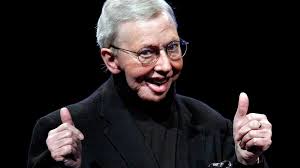Roger Ebert has taken “a leave of presence.”
The Pulitzer Prize-winning film critic lost the ability to speak, eat and drink after undergoing treatment for thyroid and salivary cancers in 2006 – but was back reviewing films the next year. Having lost his voice, Ebert ramped up his online presence, turning to social media and other digital venues. What began as a way to communicate with others blossomed into a social phenomenon:
Roger Ebert has taken “a leave of presence.”
The Pulitzer Prize-winning film critic lost the ability to speak, eat and drink after undergoing treatment for thyroid and salivary cancers in 2006 – but was back reviewing films the next year. Having lost his voice, Ebert ramped up his online presence, turning to social media and other digital venues. What began as a way to communicate with others blossomed into a social phenomenon:
“… Ebert actually grew more prolific in his final years. He averaged 200 movie reviews per year (last year he hit a career record of 306), kept a blog, obsessively entered the New Yorkercaption contest, and wrote the occasional Op-Ed. But he unexpectedly thrived on Twitter.
Ebert proved a master of the 140-character missive, delighting his legion of over 800,000 followers. Ebert’s penchant for controversy and quirky factoids on Twitter helped bring about a larger conversation about society and public affairs: “I am in conversation. When you think about it, Twitter is something like a casual conversation among friends over dinner: Jokes, gossip, idle chatter, despair, philosophy, snark, outrage, news bulletins, mourning the dead, passing the time, remembering favorite lines, revealing yourself.”
While his grasp of social media is impressive, he was no stranger to writing for an audience. Ebert even expressed his appreciation for his followers on his blog: “[You] inspire me to think in a different way about the site and the blog. You are there, you are intelligent, among the group of you I believe you have seen just about every film worth seeing, and some of you remember them in minute detail.”
What Ebert appreciated about social media was not necessarily the opportunity to be put on a bigger pedestal, but the chance to become a part of an interactive community of commentators. Ebert used blogging not as a platform to elevate himself but as a soundboard to hear ideas, opinions, and objections from readers.
Film criticism, like social media, is not a one-way street; it’s more like a four-way intersection bustling with the to and fro of the free exchange of ideas, and occasionally clogged with the deadlock of conflicting opinions. What Ebert wanted was to provoke a passionate and democratic discussion of good and bad films. Just as Ebert sought to inspire thought and debate through his film reviews, social media provided an outlet for interactive discussions surrounding film, politics and social issues.
By the end, Ebert had transformed himself into a kind of one-man social media agency, writing over 30,000 tweets before his death. Not bad for someone who swore he would “never become a Twit.” In addition to his Twitter, Facebook, website, and Ebertfest, an annual film festival, he created a digital entity of own: Ebert Digital, which serves as a culmination of his life’s work.
Social media has allowed Ebert to build a digital media empire of his own that will stand the test of time, which includes over 10,000 movie reviews written over the course of forty-six years. That doesn’t include his tweets, or blog posts on rogerebert.com or his twenty books.
Ebert’s legacy continues because of social media. Ebert stated in his final post that he was taking a “leave of presence.” Thanks to his online presence, to use his own succinct words, he’s “not going away.”
For more information about search engine optimization, please contact Long Island SEO agency fishbat.


